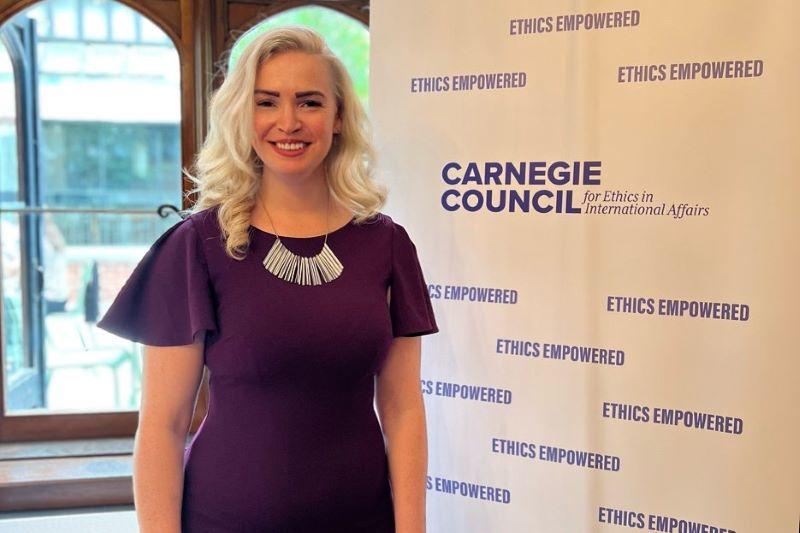-

Hear from Monica Toft, Academic Dean
Learn how Monica Toft, Academic Dean, is shaping the study of global affairs and diplomacy at Fletcher.
Hear from Prof. Toft -

Explore Fletcher academics in action
Fletcher Features offers insights, innovation, stories and expertise by scholars.
Get global insights -
Get application tips right from the source
Learn tips, tricks, and behind-the-scenes insights on applying to Fletcher from our admissions counselors.
Hear from Admissions -

Research that the world is talking about
Stay up to date on the latest research, innovation, and thought leadership from our newsroom.
Stay informed -
Meet Fletcherites and their stories
Get to know our vibrant community through news stories highlighting faculty, students, and alumni.
Meet Fletcherites -

Forge your future after Fletcher
Watch to see how Fletcher prepares global thinkers for success across industries.
See the impact -

Global insights and expertise, on demand.
Need a global affairs expert for a timely and insightful take? Fletcher faculty are available for media inquiries.
Get in Touch
Orchestrating a New Symphony Within Global Affairs
Samantha Hubner F22 liaises between sectors through ethics, security, and AI policy

Last fall, the Carnegie Council for Ethics in International Affairs introduced a new fellowship to empower young leaders in identifying and addressing the world’s most critical ethical issues–both present and future. After being named an inaugural Carnegie Ethics Fellow in late 2022, Samantha Hubner F22 began her professional training in investigating global affairs issues from an impact-driven and ethical perspective.
The cohort includes young professionals who come from various sectors: investment banking and academia, nonprofits and labor movements. Much to her surprise, Hubner learned that the program is overseen by a fellow alumna, Mihaela Papa F03 FG10.
“What I love about this fellowship is that we are encouraged to explore topics outside of our comfort zones but still ground the lessons learned by reflecting on how to take a more conscious and values-based leadership approach to inform how we do our day jobs.” After reading NATO’s most recent climate change impact assessment, Hubner became increasingly curious about the gaps of dialogue within the defense community. She’d first become interested in the topic after Monica Toft’s demography and national security class in spring 2022.
As program director, Papa supported Hubner’s desire to work on research evaluating ethical considerations of the ongoing securitization of climate change, particularly as it contends with climate migration. The topic is a significant departure from Hubner’s professional work as a White House staffer, working on the AI policy team in the Office of the Federal Chief Information Officer. In conjunction with other entities in the Executive Office, this office directs technology strategy and policy across the federal government’s digital systems.
Applying Ethical Principles in Government Work
Since the advent of ChatGPT, discussion surrounding the ethics of AI has permeated discourse across industries, from technology to the arts. Hubner brings her varied expertise to her professional role. She finds that choosing to embark on ethics-driven leadership training makes for an intensely enriching experience that directly feeds into her work in the Executive Office of the President.
“I believe that one of the greatest fundamental security issues of our time will be how we work to repair and instill trust between businesses, citizens, and their government institutions,” said Hubner. “I'd argue that it's really the mainspring that underpins most, if not all, of the other issues we're grappling with within the broader threat landscape. How we leverage emerging technologies in society plays a major part in addressing that.”
Hubner draws from numerous resources in order to take an interdisciplinary approach to her work. Guidance from the NIST AI Risk Management Framework as well as Executive Orders 13960 and 1409– which attempt to tackle trustworthy AI and ethical principles in racial equity and support for underserved communities–are also top of mind.
However, Hubner shared it was her love of languages that kickstarted this interdisciplinary career. After graduating from college, Hubner F22 went to Morocco to work under a research grant to immerse in French. She subsequently moved to China where she practiced Mandarin and worked at another nonprofit. She topped all this off with a summer as a dance teacher at a refugee camp in Greece, conversing with students in the various languages she’d spent her academic career studying.
“I've never trained as a linguist,” said Hubner. “I thrive in the broader thematic applications where language comes into play as a major asset. Whenever I do any security work related to NATO, I’m absolutely using my French. And with the Taiwan election security and PRC malign influence research I did at Fletcher, I was operating at a significant advantage by being able to tap into my Mandarin.”
Intersecting Challenges Require an Interdisciplinary Approach
Whether approaching new fields with the Carnegie Fellowship or continuing to investigate those to which she has devoted her academic career thus far, Hubner refers often to the encouragement and guidance she received during her time at Fletcher as a MALD student.
“AI can be an intimidating topic to engage with, especially right now. The very words—artificial intelligence—evoke a certain rhetorical idea of intangibility,” said Hubner. “If you're interested in learning more about this, or if you are getting a little tired of people saying that the world is going to end because of AI but not really telling you why, Fletcher is a great place to explore in a very accessible and inclusive atmosphere.”
In this same spirit, Hubner credits the beginnings of her academic journey and her love of languages with helping her reach where she is now. “I think everyone should take language study seriously. It is such an indispensable card to have in your back pocket if you're aiming to work in a diplomatic or policy-related field. Being able to liaise between languages, cultures, disciplines and therefore sectors, you offer so much more.”
Read more about Fletcher’s MALD program.

